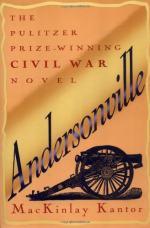We subsequently learned that we owed this good luck to Wirz’s absence on sick leave—his place being supplied by Lieutenant Davis, a moderate brained Baltimorean, and one of that horde of Marylanders in the Rebel Army, whose principal service to the Confederacy consisted in working themselves into “bomb-proof” places, and forcing those whom they displaced into the field. Winder was the illustrious head of this crowd of bomb-proof Rebels from “Maryland, My Maryland!” whose enthusiasm for the Southern cause and consistency in serving it only in such places as were out of range of the Yankee artillery, was the subject of many bitter jibes by the Rebels—especially by those whose secure berths they possessed themselves of.
Lieutenant Davis went into the war with great brashness. He was one of the mob which attacked the Sixth Massachusetts in its passage through Baltimore, but, like all of that class of roughs, he got his stomach full of war as soon as the real business of fighting began, and he retired to where the chances of attaining a ripe old age were better than in front of the Army of the Potomac’s muskets. We shall hear of Davis again.
Encountering Captain Wirz was one of the terrors of an abortive attempt to escape. When recaptured prisoners were brought before him he would frequently give way to paroxysms of screaming rage, so violent as to closely verge on insanity. Brandishing the fearful and wonderful revolver—of which I have spoken in such a manner as to threaten the luckless captives with instant death, he would shriek out imprecations, curses; and foul epithets in French, German and English, until he fairly frothed at the mouth. There were plenty of stories current in camp of his having several times given away to his rage so far as to actually shoot men down in these interviews, and still more of his knocking boys down and jumping upon them, until he inflicted injuries that soon resulted in death. How true these rumors were I am unable to say of my own personal knowledge, since I never saw him kill any one, nor have I talked with any one who did. There were a number of cases of this kind testified to upon his trial, but they all happened among “paroles” outside the Stockade, or among the prisoners inside after we left, so I knew nothing of them.
One of the Old Switzer’s favorite ways of ending these seances was to inform the boys that he would have them shot in an hour or so, and bid them prepare for death. After keeping them in fearful suspense for hours he would order them to be punished with the stocks, the ball-and-chain, the chain-gang, or—if his fierce mood had burned itself entirely out —as was quite likely with a man of his shallop’ brain and vacillating temper—to be simply returned to the stockade.




